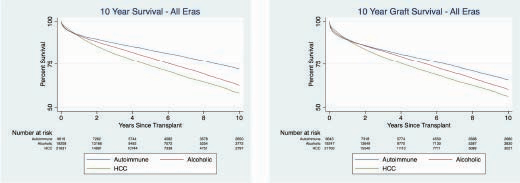Are Autoimmune Conditions Disadvantaged Compared to Alcoholic Cirrhosis and Hepatocellular Carcinoma?
Baylor College of Medicine, Houston, TX
Meeting: 2022 American Transplant Congress
Abstract number: 872
Keywords: Allocation, Liver transplantation, Mortality, Outcome
Topic: Clinical Science » Liver » 55 - Liver: Recipient Selection
Session Information
Session Time: 5:30pm-7:00pm
 Presentation Time: 5:30pm-7:00pm
Presentation Time: 5:30pm-7:00pm
Location: Hynes Halls C & D
*Purpose: Orthotopic liver transplantation (OLT) is a lifesaving therapy for patients with irreversible liver damage caused by autoimmune liver diseases (ALD) including autoimmune hepatitis (AIH), primary biliary cholangitis (PBC), and primary sclerosing cholangitis (PSC). Currently, it is unclear how indication for OLT influences allocation decisions. Our aim is to evaluate the probability of transplantation and the long-term patient and graft survival after OLT for each indication for transplant from 2000-2021.
*Methods: To do this we conducted a large retrospective study of United Network for Organ Sharing (UNOS) liver transplant patients in four 5-year eras with three cohorts: autoimmune conditions (PBC, PSC, AIH Cirrhosis), alcoholic cirrhosis, and HCC. We conducted a competing risk analysis for probability of transplant versus death on the waitlist. Both events inherently affect the probability of transplant and need to be adequately adjusted.
*Results: Across all eras for all adults, autoimmune conditions had lower probability of transplant of 0.88 (95% CI 0.86, 0.90) compared to both alcoholic cirrhosis with 1.04 (95% CI 1.04, 1.04) and hepatocellular carcinoma with 1.12 (95% CI 1.11, 1.13). Similarly, a multivariate analysis revealed a significantly lower adjusted probability of transplant for patients listed with an autoimmune. Patients with ALD had significantly better survival than both alcoholic cirrhosis and HCC in each era and across all eras (p-values all < 0.001). There was largely better graft survival for ALD compared to both alcoholic cirrhosis and HCC.
*Conclusions: Our study demonstrates that despite a higher percentage of 10-year graft and patient survival in patients transplanted for ALD, patients have a significantly lower probability of receiving a liver transplant compared to those transplanted for HCC or alcoholic cirrhosis. This study highlights the need for future research and policies aimed at reducing the disparity in liver allocation for patients with autoimmune liver disease.
To cite this abstract in AMA style:
Keeling SS. Are Autoimmune Conditions Disadvantaged Compared to Alcoholic Cirrhosis and Hepatocellular Carcinoma? [abstract]. Am J Transplant. 2022; 22 (suppl 3). https://atcmeetingabstracts.com/abstract/are-autoimmune-conditions-disadvantaged-compared-to-alcoholic-cirrhosis-and-hepatocellular-carcinoma/. Accessed March 1, 2026.« Back to 2022 American Transplant Congress

